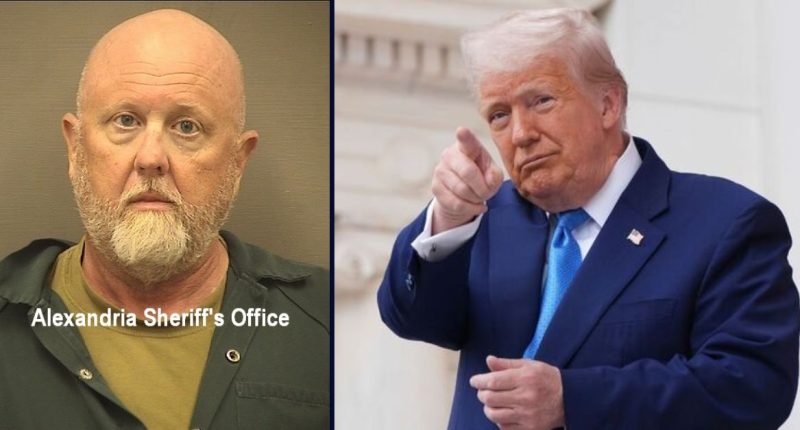Share this @internewscast.com
Left: Peter Stinson (Alexandria (Va.) Sheriff’s Office). Right: President Donald Trump attends the 157th National Memorial Day Observance at Arlington National Cemetery, Monday, May 26, 2025, in Arlington, Virginia (AP Photo/Jacquelyn Martin).
In a surprising turn of events, Peter Stinson, a former U.S. Coast Guard lieutenant, was acquitted this week of charges related to threats he allegedly made against President Donald Trump. The jury’s decision hinged on the defense argument that Stinson’s social media posts were protected under the First Amendment.
The official acquittal order was documented on October 28, 2025, with U.S. District Judge Anthony J. Trenga confirming the jury’s verdict. The judge’s filing stated, “the defendant is acquitted, discharged, and any bond exonerated,” thus concluding the legal proceedings against Stinson, who had been accused of soliciting the assassination of the president.
Stinson’s defense team maintained that his statements did not meet the legal criteria for threats that fall outside of constitutional protection. They argued that the posts lacked the necessary “specificity, imminence, and likelihood of producing lawless action” and should be seen as protected political expression instead.
In a motion to dismiss filed in September, Stinson’s attorneys highlighted the broader context of political violence, referencing the assassination of political organizer Charlie Kirk as a recent example. They emphasized, “The prevalence of such violent acts does not alter the scope of the First Amendment’s protection of speech,” asserting that Stinson’s posts were not a “serious or concrete proposal for another person to assassinate the President.”
The prosecution’s case was built on an affidavit from federal agents, who claimed that Stinson, a veteran of 33 years with the Coast Guard and a former FEMA instructor, had self-identified as a member of antifa. Starting in early 2020, he allegedly made numerous online threats against Trump, using code names such as “orange,” “one ear,” “Krasnov,” or simply an orange emoticon to reference the president. Despite these allegations, the defense successfully argued for Stinson’s acquittal, citing his constitutional rights.
Federal agents alleged Stinson, who spent 33 years in the Coast Guard and served as an instructor for the Federal Emergency Management Agency (FEMA), was a “self-identified” member of antifa and began threatening violence against Trump in social media posts dating back to early 2020, according to a probable cause affidavit filed in the U.S. District Court for the Eastern District of Virginia. Investigators said that in online posts and conversations, Stinson often threatened Trump by referring to him through code names, including variations of the word “orange,” “one ear,” “Krasnov,” or simply using the orange emoticon as a stand-in for the president.
For example, in February 2020, Stinson allegedly posted on X, formerly Twitter, that “orange must go,” meaning Trump, “at any cost.” In April of that year, he wrote that Trump “wants us dead” before adding, “I can say the same thing about him,” per the affidavit.
Three days later, he allegedly wrote that somebody “out to do more than sue the orange mf’s ass,” specifying that “It involves a rifle and a scope, but I can’t talk about it here.” Later that day, Stinson allegedly said that he would be “willing to pitch in $100 for a contract,” apparently referring to hiring a hit man to kill the president, a notion he returns to multiple times in the messages provided in the affidavit, saying it would “solve the solvable part of this problem in a crack.”
Stinson on April 6, 2020, allegedly pleaded for someone to “pull the proverbial trigger” on Trump and wrote, “I would do it. I would take the fall to save America. Too bad I don’t have the operational skills to pull it off. I am willing to serve in a support capacity for someone else with the skills to take care of things.”
Other posts from Stinson allegedly include him writing:
- “He’d look and sound better with a big red hole in his orange head,” in February 2025.
- “We know how it ends. In his third term. A couple of rounds to the chest cowering on the floor in the Oval Office,” in March 2025.
- “When he dies, the party is going to be yuge,” in June 2025.
As his case unfolded, Stinson’s lawyers argued that if a person posted on a public site, “Someone should rob the bank on King Street,” such a statement would constitute “abstract advocacy,” according to their motion to dismiss. “On the other hand, if in the midst of a power outage and general looting, a person encouraged a crowd on King Street to break into and steal from a particular bank, such conduct may support a solicitation charge,” the defense said.
Federal prosecutors, in response, stated that “Stinson is correct” and the example he provided was “particularly illustrative of why Stinson’s solicitation that someone ‘Take the shot’ and assassinate President Trump” is criminal.
“Each and every citizen of this country is entitled to his rights to engage in dialogue and express his political beliefs, no matter how vehement such speech may be,” the DOJ said. “However, where speech begins to plunge our society further into the depths of violence by calling for and normalizing political assassinations, it crosses the line.”
















